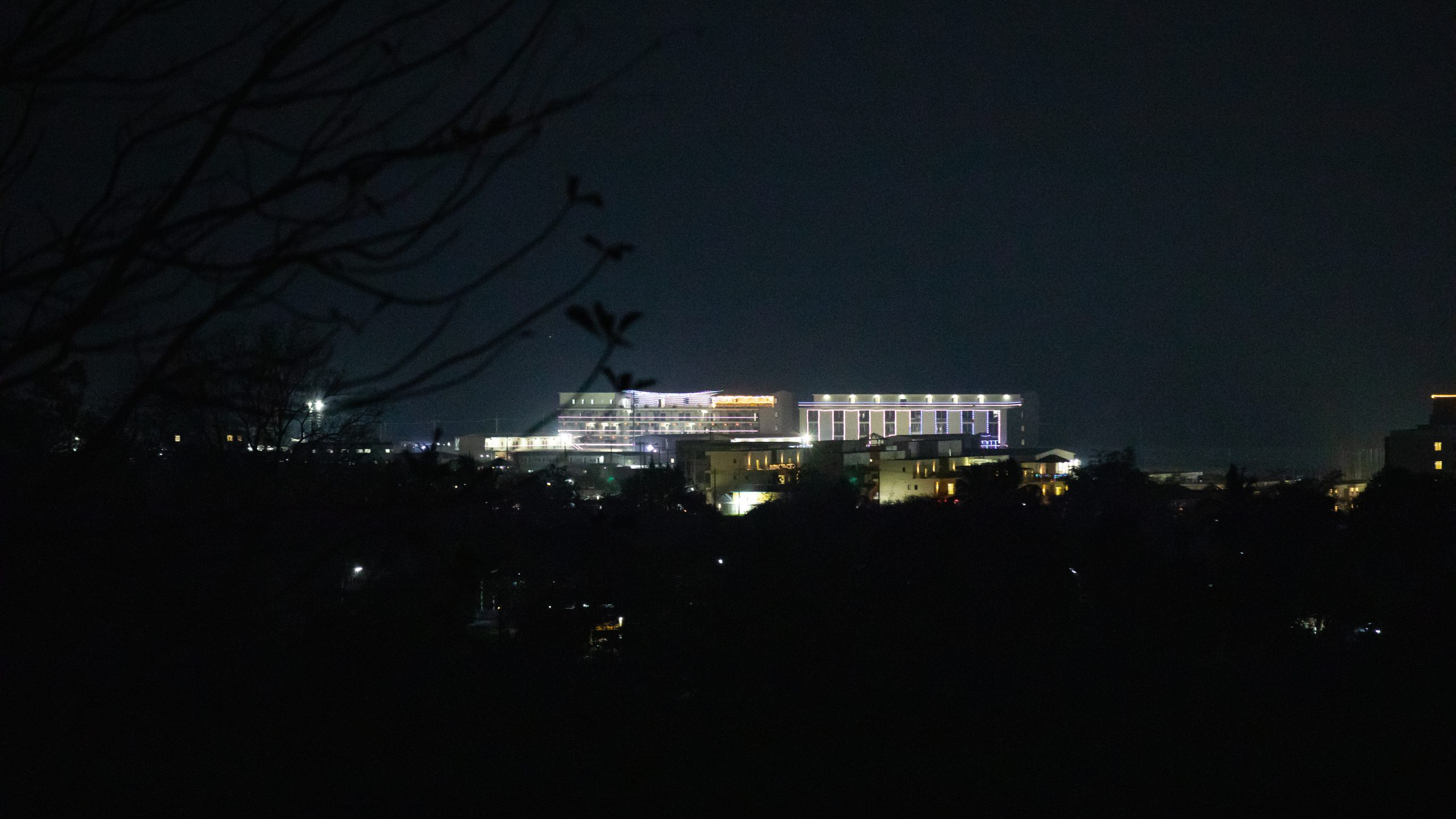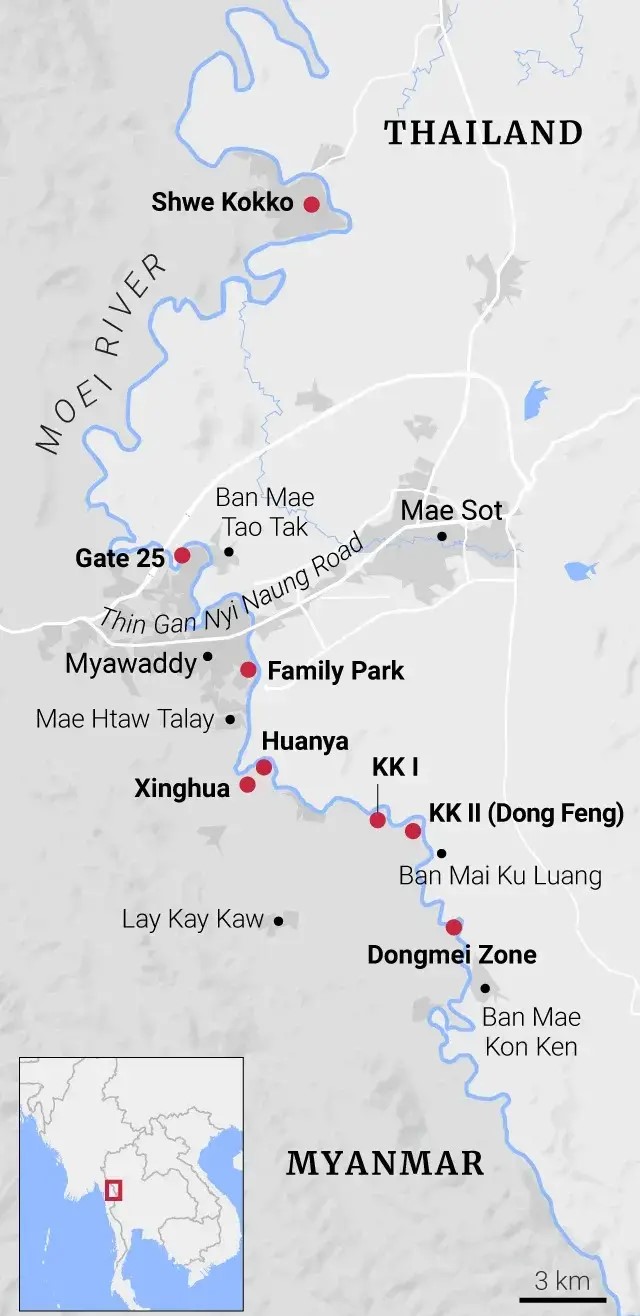The illicit economy in Myanmar has risen following the military coup in February 2021. The rise of the illicit economy is seemingly in part intentional, because the military junta, which calls itself the State Administration Council (SAC), finds opportunities to exploit outlawed business. This article analyzes how the SAC utilizes forbidden businesses to its advantage.
The rise of illegal trade since 2021
To start with the nature and scale of illicit businesses, Myanmar has the highest crime rate among 46 Asian countries and the third-highest rate among the 193 countries in the world, according to an RFA report from July 20. It is the second-largest producer of opium in the world according to the Organized Crime Index compiled by the Switzerland-based Global Initiative to Combat Cross-Border Crime.
Globally, cybercrime (online scams) is estimated to be worth US$20 billion annually according to an analyst’s presentation at a briefing by a peace support group on July 26 for Diplomatic Missions in Myanmar. In the Mekong Region, most perpetrators are from China and there are more than 50,000 websites set up to conduct scams. In 2023, as of June, Thai authorities were able to crack down on nine Chinese cybercrime ringleaders and recover 5.2 billion baht, according to the analyst.
In Myanmar, Shwe Kokko (a special economic zone developed by the Chinese in cooperation with the Border Guard Force, which controls the territory in Karen State), Pangseng (the headquarters of the United Wa State Army), and Mongla (headquarters of National Democratic Alliance Army, known as Mongla Group) in northern Shan State are the three epicenters of cybercrime activities. The perpetrators of the scams are often lured into these centers with the false promise of legitimate jobs, then held against their will and forced to trick victims into sending money. The perpetrators (workers) include people from as many as 30 countries including Myanmar’s neighbors and are monitored by CCTV and “Chinese” guards.
The country director for the Myanmar program at the United States Institute of Peace, Jason Tower, argues that the SAC’s governance failures threaten the national security of Myanmar’s neighbors and the whole region in the form of outflowing illicit drugs, drawing their citizens into border towns and forcing them to engage in cross-border human trafficking and cyber scams. This means neighboring countries and the wider region are feeling the negative impacts or the symptoms of Myanmar’s political instability and weak governance.
The increase in illicit activities has largely resulted from weakened law enforcement (as the military prioritizes cracking down on political dissidents), a rise in demand (for opium), and lack of (or limited) alternative opportunities.
SAC sees opportunities in growing trans-border crime

There are reasons to assume that the Myanmar military regime has deliberately ignored the growing illicit drugs, cybercriminal activities and human trafficking activities for its benefit. The SAC is essentially blackmailing the international community with these trans-border crimes in exchange for official engagement and crackdowns on illegal arms trafficking in order to prevent or limit the growing strength of resistance forces—known as People’s Defense Forces (PDFs) and ethnic revolutionary organizations (EROs).
Any opportunity for official engagement is politically crucial for the SAC in the context of diplomatic isolation following the coup. The SAC has been denied diplomatic representation at both the United Nations and the Association of Southeast Asian Nations (ASEAN), which is unprecedented. For instance, Ambassador Kyaw Moe Tun is the permanent representative of Myanmar to the United Nations; however, he does not represent the military junta, which tried to fire him from his post. But he refused to leave, and so far, the United Nations General Assembly Credentials Committee has refused to recognize the military’s appointee. ASEAN has also decided to invite only “non-political representatives” of Myanmar to high-level meetings.
In this context, trans-border crimes such as illicit drugs, cyber-scams and human trafficking originating from Myanmar compel neighboring governments to engage with the SAC government. Official meetings to discuss and address these issues are then framed as the “SAC is not isolated”, or “still has friends” to the domestic audience. For instance, on July 7, the SAC junta hosted (via video conferencing) the 44th ASEAN Senior Officials Meeting on Drug Matters and its Related Meetings (known as ASOD) plus three (China, India, Russia) as reported in the Global New Light of Myanmar. This is politically significant amidst the SAC’s diplomatic isolation. Such engagements/meetings also allow the SAC junta to indirectly show that the diplomatic isolation advocated by the resistance movements has failed.
Fighting trans-border crime as ‘quid pro quo’ activity

While all the subjects in discussion are illegal, the concerned governments seemingly have different priorities and levels of urgency when it comes to addressing them. Neighboring governments want to prioritize preventing/addressing narcotic drugs, cyber-scams and human trafficking, as their citizens are suffering negative impacts from these as stated above. Meanwhile, the SAC appears to want its neighbors to crack down on illegal arms trafficking. It is understandable that the SAC wants to limit or prevent arms from flowing into the hands of resistance groups. In this context, it is reasonable to assume that the SAC may want to portray fighting illicit drugs, cyber-scams, and human trafficking as “quid pro quo” activities.
At its recent meetings with neighboring states, the SAC has asked its counterparts to crack down on illegal arms trafficking on their borders with Myanmar, according to a briefing on July 26 for Diplomatic Missions in Yangon. Meanwhile, both China and Thailand have urged the SAC to tackle the illicit drugs, cybercriminal activities and human trafficking taking place in border areas.
Moreover, the SAC junta seems to be using trans-border crime as a bargaining chip in exchange for their neighbors cracking down on illegal arms trades in their own border areas, to limit or prevent arms from flowing into the hands of resistance groups. The SAC seems to think that neighboring governments need its cooperation to fight the narcotic drugs/cybercrime/human trafficking problems inside Myanmar while the SAC needs its neighbors’ cooperation in cracking down on illegal arms trafficking.
Regarding cracking down on the illicit drugs problem, Myanmar authorities have a valid point in partially blaming the neighboring governments for failing to do their parts. At a regional conference on alternative development held in Laos in March 2019, this author met an official delegation from the Central Committee on Drug Abuse Control (CCDAC) and had a chat on the issue of synthetic drugs production in Myanmar. The official said that neighboring countries share responsibility because Myanmar does not produce the necessary chemicals for production of synthetic drugs, adding that these come from neighboring countries. A study by Tom Kramer also states that “the main chemical precursors for methamphetamine production—ephedrine and pseudoephedrine—are now mostly imported from China and India, as with heroin precursors”.
In brief, as the saying goes, “Someone else’s problem is another’s opportunity”. Myanmar’s military is not the only actor capitalizing on someone’s problem. For instance, in February 2020, when Turkey announced that it will not stop refugees (mostly from Syria) going to Europe, Turkey was accused of using the migrant issue to put pressure on Europe. Likewise, China is accused of exploiting the chaos in Myanmar. In the Ukraine-Russia war, Russia is accused of “weaponizing food” after it withdrew from a grain deal.
Conclusion
It is important to see the growing illicit drugs, cybercriminal activities, human trafficking activities, and arms trafficking as symptoms of Myanmar’s political instability and weak governance, resulting from the successive failure of efforts at nation building. This means addressing the symptoms will not prevent neighboring countries and the wider region from suffering the negative impacts of these trans-border crimes.
Myanmar needs all the help it can get to address the root cause. It is at a critical juncture if it is to do so. Since the military coup in 2021, the people of Myanmar have demonstrated unprecedented national solidarity against the military dictatorship and a strong aspiration for federal democracy. If the international community really wants to address trans-border crime, it needs to help the people of Myanmar achieve the restoration of genuine democracy and the establishment of a federal democratic union. Such help will contribute to building lasting peace and stability, and improving governance, leading to effective control of the illicit economy and preventing or minimizing trans-border crime.
Zung Ring is a social worker and independent political analyst based in Myanmar.

















